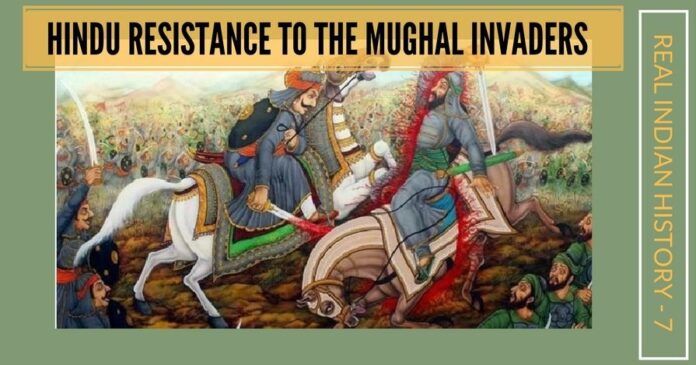
The Previous Parts of this series can be accessed here. Part 1, Part 2, Part 3, Part 4, Part 5 and Part 6 This is Part 7.
HINDU RESISTANCE TO THE NEW TURCO-MONGOL (MUGHAL) INVADERS
We’ve analyzed the Hindu resistance to the Arabs, the Ghaznavids, the Ghurids and the various Turco-Afghan Mamluk dynasties formed in India after the invasion of the Ghurids.
Hemu, a Hindu trader raised in a family of limited means, rose up to become a general in the army of the Sur Empire and won twenty-two consecutive battles against rebel Afghans. After Humayun’s death, Hemu came up with a plan to defeat the Mughals.
Hemu started a rapid march from Bengal and drove the Mughals out of Bayana, Etawah, Sambhal, Kalpi, and Narnaul, finally defeating the Mughals in a battle at Tughlaqabad in Delhi. Hemu crowned himself emperor and assumed the title of Vikramaditya. He restored Hindu rule in Delhi albeit for a very less time.
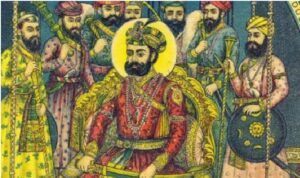
Within a month’s time, the forces of Hemu clashed with the Mughals at Panipat. Hemu’s army was on the cusp of victory but a stray arrow struck Hemu in the eye knocking him out. This totally turned the battle around. Hemu’s army lost and Hemu was executed by Akbar and his uncle Bairam Khan. Hemu’s head was sent to Kabul to terrify the Afghans, many of whom even held sympathies for the ‘Kaafir’ Hemu. His body was later gibbeted on a gate in Delhi to frighten the Hindus.
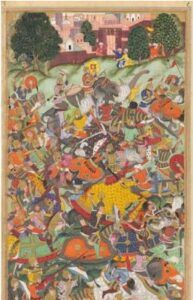
Durgavati, the Chandela Rajput ruler of Gondwana, defeated the mighty army of Akbar led by Asaf Khan. Her army forced the mighty Mughals to flee for their lives. She killed herself on the battlefield rather than risk being captured, during a battle against a larger Mughal army that returned to avenge the earlier humiliation.
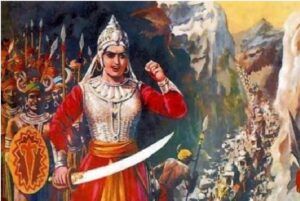
Maharana Pratap decided to challenge Akbar rather than submitting to his rule. Pratap never forgot nor did he forgive the slaughter of thirty thousand Rajputs at Chittor. Hence war became inevitable between Mewar and the Mughals. The armies clashed on the slopes of Haldighati. The Mughals won and Pratap lost everything after this battle.
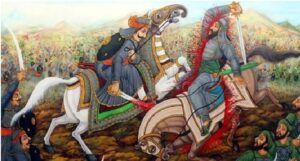
After Haldighati, Maharana Pratap said, “My brave warrior brothers, our Motherland, this holy land of Mewar, is still under the clutches of the Mughals. Today, I take an oath in front of all of you that till Chittod is freed, I will not have food in gold and silver plates, will not sleep on a soft bed and will not stay in the palace; instead I will eat food on a leaf–platter, sleep on the floor and stay in a hut. I will also not shave my beard till Chittod is freed. My brave warriors, I am sure that you will support me in every way sacrificing your mind, body and wealth till this oath is fulfilled. Jai Eklingi!”
It is important to note that Dara Shikoh was no apostate – He was a devout Muslim himself. His only crime was that he also respected other religions.
With hardly any resources and hardly any soldiers, Pratap began a legendary guerrilla war against the Mughals, never surrendering to Akbar. By the end of his life, Pratap won everything that he had lost after the battle of Haldighati except for the fort of Chittor itself.
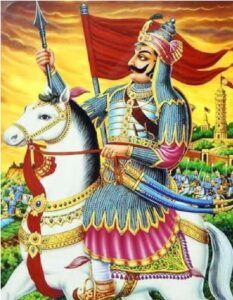
Maharana Pratap’s army not only had Rajput soldiers but had many Meenas & Bhils too (both communities have historically been a standard feature of Rajput armies).
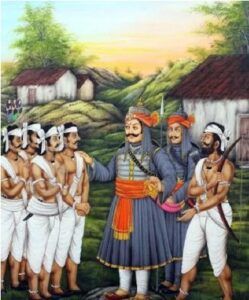
Aurangzeb, the son of Shahjahan, rose to power after killing his brother– the liberal Dara Shikoh who believed in pluralism and mutual respect.Dara Shikoh was branded a heretic and an apostate by Aurangzeb for having donated a ceiling to the Krishna temple of Mathura. Though Dara was favored by his father Shahjahan as well as by most Hindu Rajputs, orthodox Muslims in the Mughal court sided with Aurangzeb. A war of succession took place and Dara Shikoh was defeated by Aurangzeb. Dara was captured and humiliated publicly in Delhi before being executed. Aurangzeb’s Islamic fundamentalism increased over the years. He banned the public celebration of festivals such as Diwali and Holi and even banned music.
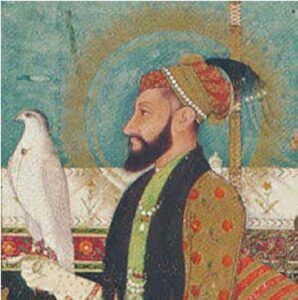
According to the Akhbãrãt, “The Emperor learning that in the temple of Keshav Rai at Mathura there was a stone railing presented by Dara Shukoh, remarked, ‘In the Muslim faith it is a sin even to look at a temple, and this Dara had restored a railing in a temple. This fact is not credible to the Muhammadans. Remove the railing.’ By his order Abdun Nabi Khan (the faujdar of Mathura) removed it.’…’News came from Malwa that Wazir Khan had sent Gada Beg, a slave, with 400 troopers, to destroy all temples around Ujjain’ A Rawat of the place resisted and slew Gada Beg with 121 of his men.’…’The Emperor learnt from a secret news writer of Delhi that in Jaisinghpura Bairagis used to worship idols and that the Censor on hearing of it had gone there, arrested Sri Krishna Bairagi and taken him with 15 idols away to his house; then the Rajputs had assembled flocked to the Censor’s house, wounded three footmen of the Censor and tried to seize the Censor himself; so that the latter set the Bairagi free and sent the copper idols to the local subahdar.’…’The Emperor, summoning Muhammad Khalil and Khidmat Rai, the darogha of hatchet-men’ ordered them to demolish the temple of Pandharpur, and to take the butchers of the camp there and slaughter cows in the temple’ It was done.”
It is important to note that Dara Shikoh was no apostate – He was a devout Muslim himself. His only crime was that he also respected other religions. This is why he was branded as a heretic and an enemy of Islam. On the other hand, Islamic rulers like Babur drank alcohol while other Islamic rulers such as Mahmud of Ghazni and Alauddin Khilji engaged in pederasty and homosexual practices. Despite the fact that alcohol and homosexuality is haram in Islam, rulers like Babur, Ghazni, and Khilji are considered much better Muslims than Dara Shikoh by conservatives, for the only reason that the former rulers engaged in jihad against infidels while the latter did not.
The name of Mathurã was changed to Islãmãbãd.”
The Maãsir-i-Ãlamgiri stated “The Lord Cherisher of the Faith learnt that in the provinces of Tatta, Multãn, and especially at Benares, the Brahman misbelievers used to teach their false books in their established schools, and that admirers and students both Hindu and Muslim, used to come from great distances to these misguided men in order to acquire this vile learning. His Majesty, eager to establish Islãm, issued orders to the governors of all the provinces to demolish the schools and temples of the infidels and with the utmost urgency put down the teaching and the public practice of the religion of these misbelievers.’…’It was reported that, according to the Emperor’s command, his officers had demolished the temple of Viswanãth at Kãshî.’..During this month of Ramzan abounding in miracles, the Emperor as the promoter of justice and overthrower of mischief, as a knower of truth and destroyer of oppression, as the zephyr of the garden of victory and the reviver of the faith of the Prophet, issued orders for the demolition of the temple situated in Mathurã, famous as the Dehra of Kesho Rãi.
In a short time by the great exertions of his officers the destruction of this strong foundation of infidelity was accomplished, and on its site a lofty mosque was built at the expenditure of a large sum’…’Praised be the August God of the faith of Islãm, that in the auspicious reign of this destroyer of infidelity and turbulence, such a wonderful and seemingly impossible work was successfully accomplished. On seeing this instance of the strength of the Emperor’s faith and the grandeur of his devotion to God, the proud Rajas were stifled and in amazement, they stood like images facing the wall. The idols, large and small, set with costly jewels which had been set up in the temple were brought to Agra, and buried under the steps of the mosque of the Begam Sãhib, in order to be continually trodden upon. The name of Mathurã was changed to Islãmãbãd.”
Aurangzeb took a pledge to wipe out Hinduism from the country. However, several brave warriors across the country had other plans.
. . . to be continued
- Real Indian History – Part 14 - February 19, 2018
- Real Indian History – Part 13 - February 15, 2018
- Real Indian History – Part 12 - February 12, 2018











[…] Previous Parts of this series can be accessed here. part 1, part 2, part 3, part 4, part 5, part 6, part 7, part 8A, part 8B, part 9, part 10, part 11 and part 12. This is Part […]
Fantastic,Only made people ignores their history. I like to all these series and also Indian directors to make movies on Shivajj,Rana Pratap Singh, Maharaja Ranjith Singh and many many.
From which book is this an extract? . That helps people to buy the book for reading and gifting.
It is a long list which will be provided as part of the final segment of the series. Data has been checked and cross-checked before being presented here.